|
Kick Assiest Blog
Friday, 7 April 2006
Early babies dubbed bed blockers, costly treatment of very premature babies is ''bed blocking''
Mood:
 d'oh
Now Playing: SOCIALIST HEALTH CARE ALERT
Topic: Lib Loser Stories d'oh
Now Playing: SOCIALIST HEALTH CARE ALERT
Topic: Lib Loser Stories
 Early babies dubbed bed blockers
A row has broken out after experts described the costly treatment of very premature babies as "bed blocking". Early babies dubbed bed blockers
A row has broken out after experts described the costly treatment of very premature babies as "bed blocking".
A report by the birth specialists' professional body said the care of sicker babies was compromising services for healthier babies and their mothers.
Costs must be considered as experts became able to save more and more earlier babies, the Royal College of Obstetricians and Gynaecologists added.
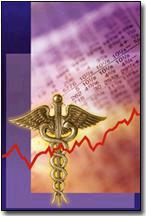 Premature baby charity Bliss said such babies had as many rights as others.
A Bliss spokesman said to deny a baby born under 25 weeks the right to at least an examination would be a gross abuse of their human rights.
He added: "Decisions as to what course of treatment is appropriate should be based in the individual circumstances of each baby rather than a blanket policy of not treating patients born at less than a certain gestation.
"There are many circumstances in which it would not be ethical to propose aggressive medical intervention and these become apparent during examination of the baby."
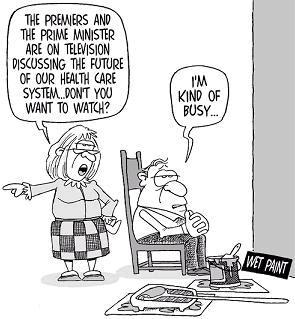 Bliss chief executive Rob Williams said: "We might as well have a policy of not treating victims of car crashes which occur at over 50 miles an hour, or denying medical services to those over a certain age."
'Success'
But a spokeswoman for the royal college said there was a proper professional concern around the high death and disability rate of babies born under 25 weeks.
The RCOG report to the Nuffield Council on Bio-ethics said: "Some weight should be given to economic considerations as there is a real issue in neo-natal units of 'bed blocking'; whereby women have to be transferred in labour to other units, compromising both their and their babies' care.
 "One of the problems of the 'success' of neonatal intensive care is that the practitioners are always pushing the boundaries.
"There has been a constant need to expand numbers of cots to cover the increasing tendency to try and rescue baby at lower and lower gestations."
President of the Royal College of Paediatrics Professor Alan Craft said many paediatricians would support moves to bring in a model followed in the Netherlands of no active intervention for these very early babies.
 Inquiry Inquiry
He added: "The vast majority of children born at this gestation who do survive have significant disabilities.
"There is a lifetime cost and that needs to be taken into the equation when society tries to decide whether it wants to intervene."
A spokeswoman for the RCOG said the welfare of all mothers and babies requiring care because of premature birth or delivery is of primary concern.
"We would welcome further discussion with colleagues about the management of all mothers and babies in this difficult situation."
The Nuffield Council is conducting a two-year inquiry into prolonging life in premature babies.
 'Inhumane' 'Inhumane'
Among the questions the consultation is asking is whether the economics of treating and then bringing up a disabled child should be a factor in decisions made by doctors and parents about whether to continue treating very sick babies.
Pressure group Patient Concern said the attitude of the Royal College of Obstetricians and Gynaecologists towards premature babies would horrify potential parents.
The group's co-director Joyce Robins said: "Babies born at 24 weeks have nearly a 40% chance of survival. What is the next step? Withholding treatment from anyone with cancer, heart or respiratory disease who has only a 40% chance of a worthwhile life?
"Once we have doctors marking people for life or death on this inhumane basis, we shall find ourselves in a terrifying society."
BBC News ** Early babies dubbed bed blockers
Posted by yaahoo_2006iest
at 7:00 PM EDT
More Saddam Mass Graves Found, Media Ignores
Mood:
 don't ask
Topic: News don't ask
Topic: News
 Iraqis Find 8 Mass Graves Containing 1,000 Bodies, Kurds Say Iraqis Find 8 Mass Graves Containing 1,000 Bodies, Kurds Say
Eight mass graves containing about 1,000 bodies were discovered in northern Iraq, President Jalal Talabani's political party said.
The graves were found yesterday in the villages of al-Asri and Tubazawa, west of Kirkuk, the Patriotic Union of Kurdistan said on its Arabic-language Web site today. Two of the sites contained at total of at least 800 bodies, the party said.
Most of the dead were Kurds, while others were Christians who lived in the two majority-Kurdish villages, the PUK said. No further details were immediately available.
 Ousted Iraqi leader Saddam Hussein initiated a wave of violence from 1987 to 1988, called the Anfal campaign, to punish the Kurdish minority for siding with Iran in the Iran-Iraq war.
Hussein is facing charges of genocide for that three-phase military campaign, which left as many as 180,000 people dead, and is already on trial for the 1982 massacre of 148 Shiite Muslims from the village of Dujail.
An estimated 500,000 people were killed by the regime in the northern Sulaimaniya, Arbil, and Duhok provinces, which have been under Kurdish control since the end of the 1991 Gulf War, according to Iraq's Human Rights Ministry.
There are at least 290 mass graves across Iraq and about 50 percent of Iraq's population is missing at least one family member, the ministry has said.
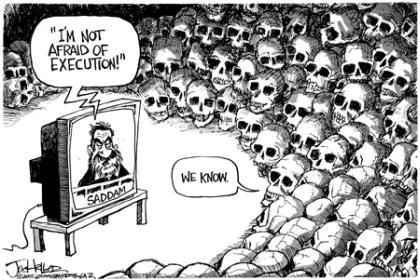
Bloomberg ~ Caroline Alexander ** Iraqis Find 8 Mass Graves Containing 1,000 Bodies, Kurds Say
Posted by yaahoo_2006iest
at 6:44 PM EDT
Putin Vindicated?, Saddam may have planned terrorist attacks on US
Mood:
 chatty
Topic: Yahoo Chat Stuff chatty
Topic: Yahoo Chat Stuff
 Putin Vindicated?
In 2004 the Russian president said that Saddam had planned terrorist attacks on America. New Iraqi documents suggest he may have been right. Putin Vindicated?
In 2004 the Russian president said that Saddam had planned terrorist attacks on America. New Iraqi documents suggest he may have been right.
In July 2004, during the course of a little-publicized event while on a visit to Kazakhstan, Russian President Vladimir Putin made some unusual remarks:
I can confirm that after the events of September 11, 2001, and up to the military operation in Iraq, Russian special services and Russian intelligence several times received ... information that official organs of Saddam's regime were preparing terrorist acts on the territory of the United States and beyond its borders, at U.S. military and civilian locations.
Putin's remarks were little noticed by the American press, coming as they did so soon after the release of the 9/11 Commission's report. Moreover, despite his strong opposition to the war in Iraq, Putin was unabashedly in favor of Bush's reelection, having earlier criticized Senator Kerry for supporting unilateral action against Serbia while opposing it with regard to Iraq. Putin went so far as to claim in October 2004 that "The goal of international terrorism is to prevent the election of President Bush to a second term."
 And one of the newly-released Iraqi documents, BIAP 2003-000654, indicates that Putin may have been on to something. On page 6 of the document it is revealed that:
The top secret letter 2205 of the Military Branch of Al Qadisya on 4/3/2001 announced by the top secret letter 246 from the Command of the military sector of Zi Kar on 8/3/2001 announced to us by the top secret letter 154 from the Command of Ali Military Division on 10/3/2001 we ask to provide that Division with the names of those who desire to volunteer for Suicide Mission to liberate Palestine and to strike American Interests and according what is shown below to please review and inform us.
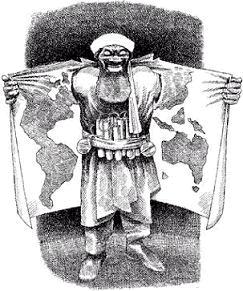 Written by the commander of Iraq's Ali Bin Abi Taleb Air Base, this document, if authentic, indicates that Iraq was actively recruiting suicide bombers with the intention of targeting U.S. interests at least as far back as early 2001. Nor is this the only document released with the intention of making it clear that Saddam's intentions for carrying out terrorist attacks against other nations--the plans for Blessed July appear to lay out a similar agenda focusing on using the Saddam Fedayeen to carry out a bombing and assassination campaign in London, Iran, and the "self ruled" areas of Iraq, a likely reference to Iraqi Kurdistan. While these documents do not by themselves prove the veracity of Putin's remarks, if they are deemed to be authentic they would appear to indicate that his claims did not occur in a vacuum.
If either document can be verified as accurate, it would seem to refute a long-standing contention among members of the U.S. intelligence community that Iraq ceased its involvement in international terrorism after its failed 1993 plot to assassinate former President George H.W. Bush. Indeed, the following exchange is reported in former counterterrorism chief Dick Clarke's book Against All Enemies:
 [Anti-terror czar Dick Clarke said], "I am unaware of any Iraqi-sponsored terrorism directed at the US since 1993, and I think FBI and CIA concur in that judgment?" CIA Deputy Director John McLaughlin replied, "Yes, that is right. We have no evidence of any active Iraqi terrorist threat against the US." [Anti-terror czar Dick Clarke said], "I am unaware of any Iraqi-sponsored terrorism directed at the US since 1993, and I think FBI and CIA concur in that judgment?" CIA Deputy Director John McLaughlin replied, "Yes, that is right. We have no evidence of any active Iraqi terrorist threat against the US."
It would be sad to learn that the Russian Federation's intelligence service was better informed as to Iraq's terrorist capabilities than were their American counterparts.
Dan Darling is a counterterrorism consultant.
Weekly Standard ~ Dan Darling ** Putin Vindicated?
Posted by yaahoo_2006iest
at 6:35 PM EDT
Unemployment rate drops to 4.7%
Mood:
 special
Now Playing: BUSH'S FAULT
Topic: News special
Now Playing: BUSH'S FAULT
Topic: News
 I am sure the mainstream media will tear it down and if you can find it, it will be on page 99 of section Z...
  March unemployment slips to 4.7% March unemployment slips to 4.7%
 WASHINGTON WASHINGTON - Employers added 211,000 jobs in March and the unemployment rate unexpectedly slipped back to a 4-1/2-year low 4.7%, the government said Friday.
 The report is likely to keep concern about potential inflation on the front burner.
 The pace of hiring last month was stronger than the 190,000 jobs that had been forecast by analysts, who also had expected the unemployment rate to be unchanged at February's 4.8%. The March rate ended up matching January's jobless rate, which was the lowest in 4 1/2 years.
 STATE RATES: A lot depends on where you live STATE RATES: A lot depends on where you live.
 The Labor Department modestly revised down new hiring in February to 225,000 jobs instead of the 243,000 reported last month. Labor said January new jobs totaled 154,000 instead of 170,000 - a cumulative reduction of 34,000 in the number of jobs created over those two months.
 President Bush, whose poll standings have been falling in recent months, said at the White House that the newest figures make an argument for extending and renewing his tax cuts.
 "Some are now proposing that we raise taxes either by repealing the tax cuts or letting them expire," he said. "These are the same politicians who told us that letting the American people keep more of their own money would be reckless and irresponsible. They were wrong then and they are wrong now."
 Wage growth was less robust than forecast, as average hourly earnings rose 0.2% to $16.49 rather than the 0.3% expected by economists. Over the 12 months through March, wages rose 3.4%, down from 3.5% in the 12 months through February.
Not every sector recorded job growth in March. Manufacturing employment declined 5,000 after shrinking 10,000 in February and transportation industries shed 7,600 jobs last month. But overall hiring in service businesses grew 202,000 last month after increasing 194,000 in February. Goods-producing industries increased payrolls overall by 9,000 in March, fewer than the 31,000 new hires in February.
  The report showed the average time that the unemployed spent searching for work in March was 16.9 weeks, down from 17.6 weeks in February.
The employment figures come against the backdrop of a rebounding economy. Analysts believe the economy emerged from an end-of-year funk and grew at an annual rate of 4.5% or higher in the just-ended January-to-March quarter. The economy is expected to moderate in the April-to-June quarter but still turn in a good performance  .
 Contributing: Associated Press
USA Today ~ Reuters ** March unemployment slips to 4.7% Contributing: Associated Press
USA Today ~ Reuters ** March unemployment slips to 4.7%
  Statement of Statement of
Kathleen P. Utgoff -- Commissioner
Bureau of Labor Statistics
 Nonfarm payroll employment rose by 211,000 in March, following an increase of 225,000 in February. During the 12 months ending in March, monthly employment growth averaged 174,000. Over the month, there were widespread job gains in the service-providing sector. The unemployment rate was little changed at 4.7 percent.
  Employment in professional and business services rose by 52,000 in March. Several component industries continued to add jobs, including architectural and engineering services, computer systems design, management and consulting services, and services to buildings and dwellings.
  The leisure and hospitality industry added 42,000 jobs over the month, largely due to a sizable gain in food services and drinking places. Health care employment increased by 24,000, reflecting continued growth in hospitals, physicians' offices, and home health care services.
 A large job gain in general merchandise stores pushed employment in retail trade up by 29,000 in March. Wholesale trade continued to add workers over the month. Financial activities added 16,000 jobs, with continued growth in credit intermediation and in insurance.
 In the goods-producing sector, mining employment continued to grow in March, largely in support activities in oil and gas. Employment in manufacturing was about unchanged, as a gain in computer and electronic products was offset by job losses in textile mills and in plastics and rubber products. Construction employment also was essentially unchanged in March, after rising by 81,000 in the previous 2 months.
 Average hourly earnings for private production or nonsupervisory workers rose by 3 cents in March, following an increase of 6 cents in February. Over the year, hourly earnings increased by 3.4 percent. The average workweek was unchanged in March, at 33.8 hours. The manufacturing workweek and overtime hours also were unchanged, at 41.0 and 4.5 hours, respectively.
  Turning to data from the household survey, both the number of unemployed persons (7.0 million) and the unemployment rate (4.7 percent) were little changed in March. Over the year, the unemployment rate has come down from 5.1 percent. Total employment and the labor force continued to trend up in March. The number of persons working part time for economic reasons edged down over the month.
 This month, we again report on the labor force status of survey respondents who evacuated from their homes due to Hurricane Katrina. The data are derived from a special set of questions that have been included in the household survey since October to gather information about evacuees. The estimates do not account for all persons who evacuated from their homes due to the hurricane; information is not gathered on those evacuees who remain outside the scope of the survey, such as those currently living in hotels or shelters.
 Data for March indicated that there were about 1 million persons age 16 and over who evacuated from their August residences due to Hurricane Katrina. In March, about one-half of the evacuees were again living in the homes they vacated in August. Among Katrina evacuees identified in March, 53.6 percent were in the labor force, and their unemployment rate was 16.5 percent. Unemployment rates were much lower for those evacuees who were living at their pre-Katrina residences (5.3 percent) than for those who were living elsewhere (34.7 percent).
 To summarize the labor market data for March, nonfarm payroll employment rose by 211,000, following a gain of 225,000 in February. The unemployment rate was about unchanged in March at 4.7 percent.
Bureau of Labor Statistics ~ Kathleen P. Utgoff ** Unemployment down to 4.7% (PDF File)
Posted by yaahoo_2006iest
at 4:03 PM EDT
Updated: Friday, 7 April 2006 4:28 PM EDT
Consumer Confidence in Economy Improves
Mood:
 bright
Now Playing: BUSH'S FAULT
Topic: News bright
Now Playing: BUSH'S FAULT
Topic: News
  Consumer Confidence in Economy Improves
WASHINGTON Consumer Confidence in Economy Improves
WASHINGTON - Consumer confidence in the economy's prospects improved in early April even as gasoline prices and borrowing costs marched higher.
The RBC CASH (Consumer Attitudes and Spending by Household) Index, based on results from the international polling firm Ipsos, showed confidence at 89.4 in early April, up from March's 86.2. The new reading also was better than a year ago, when consumer confidence clocked in at 84.5.
 "It's a positive sign," said Stuart Hoffman, chief economist at PNC Financial Services Group.
 Overall, consumers are in a generally good frame of mind, economists said.
"I think we can take heart in the fact that even with all the worries - about energy prices, higher interest rates and a slowing housing market - confidence moved higher," said economist Ken Mayland, president of ClearView Economics.
Analysts track consumer confidence for clues about consumers' willingness to spend, an important force shaping the country's economic health.
 The confidence index is benchmarked to a reading of 100 on January when Ipsos started the gauge.
One of the things consumers feel really good about is the jobs climate, the Ipsos results suggested.
 A measure tracking consumers' sentiments on this front jumped in early April to 124.5, the highest on record. In March consumers' feelings about jobs came in at 118.5, a buoyant reading. A year ago, this gauge stood at 116.2.
Employers boosted payrolls by a sizable 211,000 jobs in March, helping to push the nation's unemployment rate down to 4.7 percent, the Labor Department said in a report Friday that suggested the jobs market is on solid footing.
 Analysts believe the economy emerged from an end-of-year funk and grew at an annual rate of 4.5 percent or higher in the just ended January- to-March quarter. The government's estimate of first-quarter economic growth will be released at the end of April.
In the current April-to-June quarter, economists believe the economic growth will probably be in the range of 3 percent, a slower but still healthy pace. That moderation is based in part on the expectation that consumers will turn a bit cautious in the second quarter as energy prices stay high and the housing market slows.
 The record-breaking housing market over the last five years and escalating home values have made consumers feel wealthy and thus inclined to spend. They've taken cash out of their homes, which has helped to support brisk spending.
A cooling housing market and slower growth in home values probably would weigh on consumer spending, economists said. But an improving jobs market, on the other hand, would help to blunt some of that negative force, analysts said.
Concerns about the direction of the housing market _ along with rising gasoline prices, which are $2.59 a gallon on average nationwide _ probably played a role in consumers' assessment of current economic conditions, analysts said.
 A measure of current conditions dropped to 98 in early April, from 103.9 in March. A year ago, this measure stood at 92.7.
Another gauge tracking consumers' feelings about making a purchase, saving and other investment decisions was 86.7 in early April. That marked a deterioration from March's reading of 98.6. Last year, the investment measure was 87.4.
The Federal Reserve on March 28 boosted a key interest rate to a five- year high to fend off inflation. That action pushed up other borrowing costs, including banks' prime lending rate, which is used for certain credit cards, home equity lines of credit and other loans.
 Mortgage rates are rising, too.
Rates on 30-year mortgages averaged 6.43 percent this week, the highest in 2 1/2 years, Freddie Mac, the mortgage giant, reported Thursday.
A measure looking at consumers' expectations over the next six months, including conditions where they live or work and their own financial positions, rose to 56.9 in early April. That marked an improvement from March's 40.7 and was better than 51.3 registered in April last year. Yet it is still at a level indicating some wariness among consumers, analysts said.
 The RBC consumer confidence index was based on results of 1,003 adults surveyed Monday through Wednesday about their attitudes on personal finance and the economy. Results of the survey had a margin of error of plus or minus 3 percentage points.
 On the Net: RBC CASH Index On the Net: RBC CASH Index
 Breitbart.com ~ Associated Press - Jeannine Aversa ** Consumer Confidence in Economy Improves Breitbart.com ~ Associated Press - Jeannine Aversa ** Consumer Confidence in Economy Improves
Posted by yaahoo_2006iest
at 3:09 PM EDT
Updated: Friday, 7 April 2006 3:23 PM EDT
Abortion Practitioner Who Killed Girl in Failed Abortion Hits Pro-Lifer With Car
Mood:
 don't ask
Now Playing: LIBTARD ''COMPASSION'' ALERT
Topic: Lib Loser Stories don't ask
Now Playing: LIBTARD ''COMPASSION'' ALERT
Topic: Lib Loser Stories
  Unbelievable. Then again, when you kill for a living, maybe all those blobs of tissues just start looking the same...
 Abortion Practitioner Who Killed Girl in Failed Abortion Hits Pro-Lifer With Car Abortion Practitioner Who Killed Girl in Failed Abortion Hits Pro-Lifer With Car
 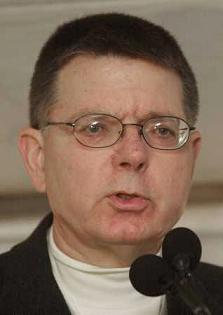 Wichita, KS Wichita, KS - A Kansas late-term abortion practitioner who killed a 19 year-old girl in a botched abortion last year has allegedly run over a pro-life person with his car who was praying outside his abortion business.
George Tiller (right), who may soon find himself subject to a grand jury investigation, apparently struck the protester with his vehicle yesterday.
 According to eyewitnesses, Tiller was leaving his Women's Health Care Services (WHCS) abortion facility Wednesday afternoon, when he sped out of the parking lot and struck pro-life advocate Mark Geitzen in the leg.
In a statement provided to LifeNews.com, Geitzen said he was hit in the leg by Tiller's speeding Jeep Grand Cherokee and placed his hands on Tiller's vehicle to push himself further away to avoid being run over.
"I was measuring the driveway to insure that pro-lifers were complying with the law during their prayer times when I heard an engine rev," Geitzen explained.
"I turned to see Tiller coming right at me," Geitzen said. "In that moment I couldn't decide to jump to the right or to the left. I was kind of like a deer caught in the headlights."
 Eyewitnesses said Tiller immediately fled the scene. Geitzen has filed a complaint with the Wichita Police Department.
Geitzen said he was not injured in the incident but feels some pain in his right leg. Another man who was with Geitzen at the time was not involved in the hit and run.
Geitzen indicated he was not blocking the exit and that Tiller had plenty of room to drive around him, as there is room for two vehicles to enter and leave the abortion facility parking lot exit at any time.
 "There is no doubt that he intentionally hit me," he said. "He drove right down the center of the driveway."
 Geitzen is the president of the Kansas Coalition for Life, a group that is part of a coalition of pro-life organizations working with the family of mentally disabled teenager Christin Gilbert to have a grand jury look into her abortion death.
Gilbert died after a third-trimester abortion in January 2005, done by Tiller at is abortion business. She was 28 weeks pregnant at the time.
Gilbert was rushed into the Wesley Medical Center ER, followed by Tiller moments later. In November, the Kansas Board of Healing Arts claimed neither he nor his staff were responsible for the botched abortion death and refused to press charges.
Gilbert's family, with the help of pro-life groups, are planning to file thousands of petitions on Friday asking the county court to call for a grand jury investigation into the abortion death  .
Related: Justice for Christin
Life News ~ Steven Ertelt ** Abortion Practitioner Who Killed Girl in Failed Abortion Hits Pro-Lifer With Car
Posted by yaahoo_2006iest
at 2:43 PM EDT
Updated: Friday, 7 April 2006 4:33 PM EDT
FLASHBACK: February 13, 1998: Scientists blame sun for global warming
Mood:
 bright
Topic: Yahoo Chat Stuff bright
Topic: Yahoo Chat Stuff
 Scientists blame sun for global warming
The Sun is more active than it has ever been in the last 300 years Scientists blame sun for global warming
The Sun is more active than it has ever been in the last 300 years
Climate changes such as global warming may be due to changes in the sun rather than to the release of greenhouse gases on Earth.
Climatologists and astronomers speaking at the American Association for the Advancement of Science meeting in Philadelphia say the present warming may be unusual - but a mini ice age could soon follow.
The sun provides all the energy that drives our climate, but it is not the constant star it might seem.
 Careful studies over the last 20 years show that its overall brightness and energy output increases slightly as sunspot activity rises to the peak of its 11-year cycle.
And individual cycles can be more or less active.
The sun is currently at its most active for 300 years.
That, say scientists in Philadelphia, could be a more significant cause of global warming than the emissions of greenhouse gases that are most often blamed.
The researchers point out that much of the half-a-degree rise in global temperature over the last 120 years occurred before 1940 - earlier than the biggest rise in greenhouse gas emissions.
 Using ancient tree rings, they show that 17 out of 19 warm spells in the last 10,000 years coincided with peaks in solar activity.
Ancient trees reveal most warm spells are caused by the sun.
They have also studied other sun-like stars and found that they spend significant periods without sunspots at all, so perhaps cool spells should be feared more than global warming.
The scientists do not pretend they can explain everything, nor do they say that attempts to reduce greenhouse gas emissions should be abandoned. But they do feel that understanding of our nearest star must be increased if the climate is to be understood.
Related:
This Blog ** Sun's next 11-year cycle could be 50% stronger, yet NO mention of global warming
Phys Org.com ** Greenhouse theory smashed by biggest stone
This Blog ** Atlantic Ocean Was a Hot Tub in Dino Era
This Blog ** New analysis shows the Sun is more active now than it's been in the past 1,000 years
BBC News ~ Friday, February 13, 1998 ** Scientists blame sun for global warming
Posted by yaahoo_2006iest
at 1:43 PM EDT
French government backs away from divisive labor law
Mood:
 d'oh
Now Playing: SOCIALIST UTOPIA ALERT
Topic: Lib Loser Stories d'oh
Now Playing: SOCIALIST UTOPIA ALERT
Topic: Lib Loser Stories
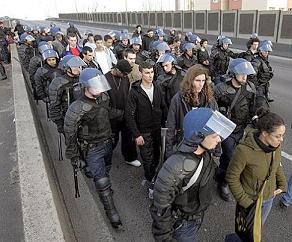 <<<<< Riot police officers detained students after they blocked the ring road in Paris. Laurence Parisot, head of the MEDEF employers' association, warned Friday that the labor protest movement could harm the French economy.
French government backs away from divisive labor law
PARIS (AFP) - France's ruling party held a final day of talks with unions on Friday over a divisive youth jobs reform, as business leaders called for a rapid end to the crisis to avoid harming the French economy.
Unions and student groups - in a position of strength after two months of demonstrations that have drawn millions into the street - have threatened more mass protests unless the measure is abandoned by the end of next week.
 French President Jacques Chirac has already effectively suspended the contested First Employment Contract (CPE), asking the ruling Union for a Popular Movement (UMP) to draw up a new law after consulting leaders of the protest movement.
Several commentators said Chirac's government appeared to have all but given up on the youth contract, which makes it easier to fire under-26 year-olds, but was looking for a way to repeal it without losing face.
"How to come up with a measure that looks, tastes and acts like an abrogation, but is not called an abrogation?" summed up an editorial in the left-wing Liberation newspaper.
UMP lawmakers on Friday were wrapping up three days of meetings with unions and student groups, as well as the MEDEF employers' association and the CGPME small business federation, before deciding on the contents of the new law.
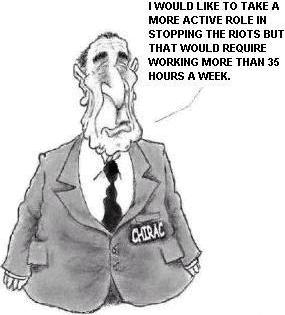 The government was expected to decide on action in the coming days. Lawmakers close to Interior Minister Nicolas Sarkozy said one possible way out might be drawing up measures with labor leaders to replace the law.
"We are moving toward the opening of negotiations," said lawmaker Dominique Paille. Another lawmaker, Yves Jego, said the idea had the backing of many in parliament. But it was unclear whether it would satisfy unions, or whether it had Chirac's backing.
One union, Solidaires, said after meeting the UMP that the party "understood the urgency" of the situation, but that no announcement would be made before Monday.
MEDEF head Laurence Parisot warned Friday that the protest movement - in which students have targeted transport and industry - could harm the French economy.
 "We must do everything to quickly end this crisis, which is costing our country dearly," she told France 2 television."It is time to end this colossal disruption, which harms not only our image but our very social fabric."
Prime Minister Dominique de Villepin's authority has been badly undermined by the labor conflict and some observers believe his chances as a presidential candidate have been destroyed, although on Thursday he ruled out resigning over the crisis. Responsibility for negotiating a way out of the crisis has been handed to his chief political rival, UMP chief and Interior Minister Nicolas Sarkozy.
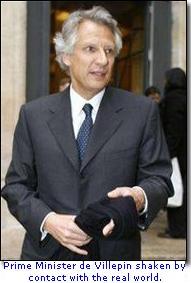 Commentators say that many supporters of Sarkozy in the UMP are angry at Villepin's handling of the reform and feel little attachment to the CPE.On Friday, former minister Roselyne Bachelot - a Sarkozy ally and senior UMP official - became the latest party figure to call openly for the CPE to be scrapped.
"Speaking in my own name, I want an abrogation, so that we can put this behind us," she said on Canal Plus television.
Conceived as a tool against youth unemployment, which runs at 22% in France, the CPE is a contract for under 26-year-olds that can be terminated by the employer without explanation during a two-year trial period.
It provoked a massive backlash, with Villepin accused of trampling on labor rights, and a sometimes violent protest movement in which more than 3,500 people have been arrested.
 Students have been staging wildcat protests to keep up the pressure on the government - blocking two factories belonging to the aircraft manufacturer Airbus on Thursday - but there were signs of the movement fizzling out.
Friday marks the start of the academic holidays in around a third of the country, with other regions to follow, and there are mounting calls for work to resume at disrupted schools and universities in time for end-of-year exams.
Wildcat protests continued in some areas, however, such as in Nantes in the west, students blocked bus and tramway depots for several hours.In Le Havre in the north, around 400 students occupied the offices of a UMP deputy before heading to the courtroom and city hall to press their demands.
Contributing: The Associated Press
USA Today ~ Agence France-Presse ** French government backs away from divisive labor law
Posted by yaahoo_2006iest
at 1:24 PM EDT
Updated: Friday, 7 April 2006 1:26 PM EDT
Motorist Drives Through Crowd in Paris
Mood:
 don't ask
Now Playing: SOCIALIST UTOPIA ALERT
Topic: Lib Loser Stories don't ask
Now Playing: SOCIALIST UTOPIA ALERT
Topic: Lib Loser Stories
 Motorist Drives Through Crowd in Paris
PARIS Motorist Drives Through Crowd in Paris
PARIS - A motorist drove through a crowd of students protesting the government's new youth jobs law Friday near the Sorbonne University, injuring seven people.
Furious demonstrators overturned the car and tried to kick its windows out, while police in riot gear and helmets worked to disperse the crowd.
The incident came after high school students spent the afternoon disrupting traffic outside the Sorbonne by picnicking on a busy boulevard. They were heading away when a frustrated motorist tried to burst through the crowd 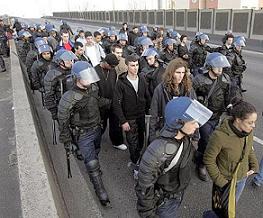 .
Several dozen youths turned the car over and unsuccessfully attempted to drag the driver out before police and onlookers intervened.
Firefighters said seven people suffered light injuries.
French students have been protesting for weeks over a new law that will make it easier for companies to hire and fire people under age 26. While most demonstrations have been peaceful, some have seen violence from a radical fringe.
Breitbart.com ~ Associated Press ** Motorist Drives Through Crowd in Paris
Posted by yaahoo_2006iest
at 1:03 PM EDT
Updated: Friday, 7 April 2006 1:07 PM EDT
Thursday, 6 April 2006
Dem Poll Warning: Black Republican Candidate Attracting Large Number Of Black Voters
Mood:
 d'oh
Topic: Lib Loser Stories
Poll Finds Steele May Be Magnet for Black Voters
Candidate's Ties to President Bush Judged a Potential Vulnerability d'oh
Topic: Lib Loser Stories
Poll Finds Steele May Be Magnet for Black Voters
Candidate's Ties to President Bush Judged a Potential Vulnerability
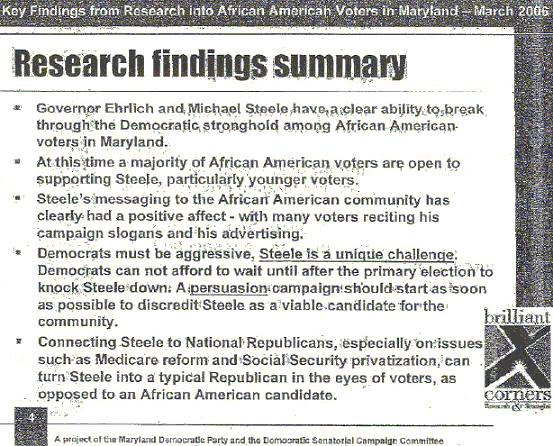
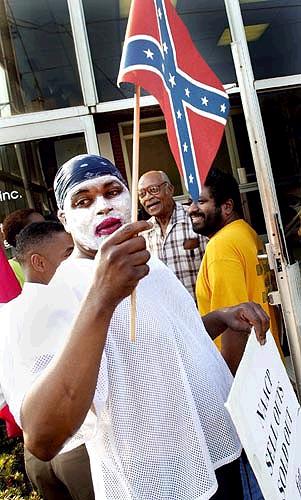 An internal document prepared by a top Democratic strategist warns that a majority of African American voters in Maryland are open to supporting Republican Senate candidate Michael S. Steele and advises the party not to wait to "knock Steele down." An internal document prepared by a top Democratic strategist warns that a majority of African American voters in Maryland are open to supporting Republican Senate candidate Michael S. Steele and advises the party not to wait to "knock Steele down."
The 37-page report says a sizable segment of likely black voters -- as much as 44 percent -- would readily abandon their historic Democratic allegiances "after hearing Steele's messaging."
"Governor Ehrlich and [Lt. Gov.] Michael Steele have a clear ability to break through the Democratic stronghold among African American voters in Maryland," says the March 27 report by Cornell Belcher, polling consultant for the Democratic National Committee, which bases its findings on a survey of 489 black voters in Maryland conducted last month.
The report, given to The Washington Post this week, drills into a topic that has emerged as a key focus of this year's U.S. Senate contest in Maryland: race.
In 2002, Steele became the first African American elected to statewide office in Maryland, and he has designed his Senate campaign to cut into the black support that has traditionally flocked to Democrats.
More than a half-dozen Democrats are vying for the open seat being vacated by Paul S. Sarbanes (D), including the former head of the NAACP, Kweisi Mfume.
 Maryland Democratic Party Executive Director Derek B. Walker said the study verified what, internally, party strategists had already concluded: that African American voters who have served as a reliable base for generations cannot be taken for granted.
"It confirms that in this day and age, everyone expects us to do more than just rest on history," Walker said. "We knew we were going to have to engage. But we also know it will be easier for us to forge that relationship because we're right on the issues."
If the findings of the poll are correct, they paint a somewhat different vision of the black electorate from what has been commonly understood to this point, said David Bositis, a senior research associate at the D.C.-based Joint Center for Political and Economic Studies. Bositis said nothing in his research suggests that an African American Republican will be able to grab a significant segment of the black vote.
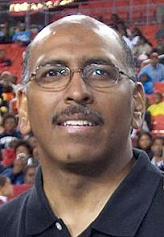 The DNC survey finds that 22 percent of black voters support Steele when matched against a "generic" Democrat.
"There's just no way it's that high," Bositis said, noting that Steele's performance among black voters in the 2002 election did not approach that number. "If he was that much of a draw then it's doubtful he would only have received 13 percent of the black vote."
There are other aspects of the survey, though, that Bositis says are consistent with national findings. Among them: that young black men represent a voting bloc far less loyal to Democrats. It also finds more support for Steele in Baltimore than in Prince George's County, more backing among churchgoers, and stronger support among those without a college degree.
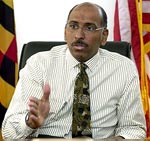 In an interview in his State House office yesterday, Steele clutched the DNC report like a football coach who just got his hands on the opposing team's playbook. He said a copy "landed on our doorstep" in the past week.
"This explains everything," he said. "They're afraid of what I represent. They're afraid of the fact that African American voters have options, and I'm one of them."
 Steele focused on two aspects of the document: the finding that a high percentage of black voters have connected with his message and the recommendation that the Democrats attack him early.
"Voters need to know they're trying to make me into something I'm not," Steele said.
He deflected questions about a potential vulnerability exposed in the report. A message that resonated with black voters identified Steele as "George W. Bush's hand-picked candidate," the survey found. It's a message Democrats have tried to exploit. Even as Walker discussed the findings, he pointed to a photograph hanging in his office -- it shows Steele and Bush arm in arm.
The poll finds that only 8 percent of black voters in Maryland approve of the president's performance. And it signals that early support Steele has received from Bush and his advisers will rub black voters the wrong way.
 "Connecting Steele to national Republicans ... can turn Steele into a typical Republican in the eyes of voters, as opposed to an African American candidate," it says.
That has been the aim of the Democrats in the race. In a statement yesterday, an aide to Rep. Benjamin L. Cardin said he found "no surprises in this poll."
"Like the vast majority of Marylanders, African Americans know that the Bush-Steele agenda is wrong for our state and our nation," said Oren Shur, the Cardin campaign spokesman.
Mfume advisers, however, said the survey should sound alarms.
"There's significance there," said Mfume strategist Walter Ludwig. "Everybody up and down the ticket needs to make sure African Americans don't feel like they're being taken for granted."
Other Democrats in the race include A. Robert Kaufman, Allan Lichtman, Josh Rales, Dennis Rasmussen and Lise Van Susteren.
Steele says he will fight Democratic efforts to frame the campaign around national issues. His campaign Web site and literature do not identify his political party and do not mention his long and close ties to the White House.
"I am independent in thought," he said. "What I'm about is what's important to Marylanders."
From The Drudge Report: Full Image of Document
Washington Post ~ Matthew Mosk ** Poll Finds Steele May Be Magnet for Black Voters
Posted by yaahoo_2006iest
at 4:45 PM EDT
Newer | Latest | Older
|
 Early babies dubbed bed blockers
A row has broken out after experts described the costly treatment of very premature babies as "bed blocking".
A report by the birth specialists' professional body said the care of sicker babies was compromising services for healthier babies and their mothers.
Costs must be considered as experts became able to save more and more earlier babies, the Royal College of Obstetricians and Gynaecologists added.
Early babies dubbed bed blockers
A row has broken out after experts described the costly treatment of very premature babies as "bed blocking".
A report by the birth specialists' professional body said the care of sicker babies was compromising services for healthier babies and their mothers.
Costs must be considered as experts became able to save more and more earlier babies, the Royal College of Obstetricians and Gynaecologists added.
 Premature baby charity Bliss said such babies had as many rights as others.
A Bliss spokesman said to deny a baby born under 25 weeks the right to at least an examination would be a gross abuse of their human rights.
He added: "Decisions as to what course of treatment is appropriate should be based in the individual circumstances of each baby rather than a blanket policy of not treating patients born at less than a certain gestation.
"There are many circumstances in which it would not be ethical to propose aggressive medical intervention and these become apparent during examination of the baby."
Premature baby charity Bliss said such babies had as many rights as others.
A Bliss spokesman said to deny a baby born under 25 weeks the right to at least an examination would be a gross abuse of their human rights.
He added: "Decisions as to what course of treatment is appropriate should be based in the individual circumstances of each baby rather than a blanket policy of not treating patients born at less than a certain gestation.
"There are many circumstances in which it would not be ethical to propose aggressive medical intervention and these become apparent during examination of the baby."
 Bliss chief executive Rob Williams said: "We might as well have a policy of not treating victims of car crashes which occur at over 50 miles an hour, or denying medical services to those over a certain age."
'Success'
Bliss chief executive Rob Williams said: "We might as well have a policy of not treating victims of car crashes which occur at over 50 miles an hour, or denying medical services to those over a certain age."
'Success' "One of the problems of the 'success' of neonatal intensive care is that the practitioners are always pushing the boundaries.
"There has been a constant need to expand numbers of cots to cover the increasing tendency to try and rescue baby at lower and lower gestations."
President of the Royal College of Paediatrics Professor Alan Craft said many paediatricians would support moves to bring in a model followed in the Netherlands of no active intervention for these very early babies.
"One of the problems of the 'success' of neonatal intensive care is that the practitioners are always pushing the boundaries.
"There has been a constant need to expand numbers of cots to cover the increasing tendency to try and rescue baby at lower and lower gestations."
President of the Royal College of Paediatrics Professor Alan Craft said many paediatricians would support moves to bring in a model followed in the Netherlands of no active intervention for these very early babies.
 Inquiry
Inquiry 'Inhumane'
'Inhumane'
 Iraqis Find 8 Mass Graves Containing 1,000 Bodies, Kurds Say
Eight mass graves containing about 1,000 bodies were discovered in northern Iraq, President Jalal Talabani's political party said.
The graves were found yesterday in the villages of al-Asri and Tubazawa, west of Kirkuk, the Patriotic Union of Kurdistan said on its Arabic-language Web site today. Two of the sites contained at total of at least 800 bodies, the party said.
Most of the dead were Kurds, while others were Christians who lived in the two majority-Kurdish villages, the PUK said. No further details were immediately available.
Iraqis Find 8 Mass Graves Containing 1,000 Bodies, Kurds Say
Eight mass graves containing about 1,000 bodies were discovered in northern Iraq, President Jalal Talabani's political party said.
The graves were found yesterday in the villages of al-Asri and Tubazawa, west of Kirkuk, the Patriotic Union of Kurdistan said on its Arabic-language Web site today. Two of the sites contained at total of at least 800 bodies, the party said.
Most of the dead were Kurds, while others were Christians who lived in the two majority-Kurdish villages, the PUK said. No further details were immediately available.
 Ousted Iraqi leader Saddam Hussein initiated a wave of violence from 1987 to 1988, called the Anfal campaign, to punish the Kurdish minority for siding with Iran in the Iran-Iraq war.
Hussein is facing charges of genocide for that three-phase military campaign, which left as many as 180,000 people dead, and is already on trial for the 1982 massacre of 148 Shiite Muslims from the village of Dujail.
An estimated 500,000 people were killed by the regime in the northern Sulaimaniya, Arbil, and Duhok provinces, which have been under Kurdish control since the end of the 1991 Gulf War, according to Iraq's Human Rights Ministry.
There are at least 290 mass graves across Iraq and about 50 percent of Iraq's population is missing at least one family member, the ministry has said.
Ousted Iraqi leader Saddam Hussein initiated a wave of violence from 1987 to 1988, called the Anfal campaign, to punish the Kurdish minority for siding with Iran in the Iran-Iraq war.
Hussein is facing charges of genocide for that three-phase military campaign, which left as many as 180,000 people dead, and is already on trial for the 1982 massacre of 148 Shiite Muslims from the village of Dujail.
An estimated 500,000 people were killed by the regime in the northern Sulaimaniya, Arbil, and Duhok provinces, which have been under Kurdish control since the end of the 1991 Gulf War, according to Iraq's Human Rights Ministry.
There are at least 290 mass graves across Iraq and about 50 percent of Iraq's population is missing at least one family member, the ministry has said.

 Putin Vindicated?
In 2004 the Russian president said that Saddam had planned terrorist attacks on America. New Iraqi documents suggest he may have been right.
In July 2004, during the course of a little-publicized event while on a visit to Kazakhstan, Russian President Vladimir Putin made some unusual remarks:
I can confirm that after the events of September 11, 2001, and up to the military operation in Iraq, Russian special services and Russian intelligence several times received ... information that official organs of Saddam's regime were preparing terrorist acts on the territory of the United States and beyond its borders, at U.S. military and civilian locations.
Putin's remarks were little noticed by the American press, coming as they did so soon after the release of the 9/11 Commission's report. Moreover, despite his strong opposition to the war in Iraq, Putin was unabashedly in favor of Bush's reelection, having earlier criticized Senator Kerry for supporting unilateral action against Serbia while opposing it with regard to Iraq. Putin went so far as to claim in October 2004 that "The goal of international terrorism is to prevent the election of President Bush to a second term."
Putin Vindicated?
In 2004 the Russian president said that Saddam had planned terrorist attacks on America. New Iraqi documents suggest he may have been right.
In July 2004, during the course of a little-publicized event while on a visit to Kazakhstan, Russian President Vladimir Putin made some unusual remarks:
I can confirm that after the events of September 11, 2001, and up to the military operation in Iraq, Russian special services and Russian intelligence several times received ... information that official organs of Saddam's regime were preparing terrorist acts on the territory of the United States and beyond its borders, at U.S. military and civilian locations.
Putin's remarks were little noticed by the American press, coming as they did so soon after the release of the 9/11 Commission's report. Moreover, despite his strong opposition to the war in Iraq, Putin was unabashedly in favor of Bush's reelection, having earlier criticized Senator Kerry for supporting unilateral action against Serbia while opposing it with regard to Iraq. Putin went so far as to claim in October 2004 that "The goal of international terrorism is to prevent the election of President Bush to a second term."
 And one of the newly-released Iraqi documents,
And one of the newly-released Iraqi documents,  Written by the commander of Iraq's Ali Bin Abi Taleb Air Base, this document, if authentic, indicates that Iraq was actively recruiting suicide bombers with the intention of targeting U.S. interests at least as far back as early 2001. Nor is this the only document released with the intention of making it clear that Saddam's intentions for carrying out terrorist attacks against other nations--the plans for
Written by the commander of Iraq's Ali Bin Abi Taleb Air Base, this document, if authentic, indicates that Iraq was actively recruiting suicide bombers with the intention of targeting U.S. interests at least as far back as early 2001. Nor is this the only document released with the intention of making it clear that Saddam's intentions for carrying out terrorist attacks against other nations--the plans for  [Anti-terror czar Dick Clarke said], "I am unaware of any Iraqi-sponsored terrorism directed at the US since 1993, and I think FBI and CIA concur in that judgment?" CIA Deputy Director John McLaughlin replied, "Yes, that is right. We have no evidence of any active Iraqi terrorist threat against the US."
It would be sad to learn that the Russian Federation's intelligence service was better informed as to Iraq's terrorist capabilities than were their American counterparts.
Dan Darling is a counterterrorism consultant.
[Anti-terror czar Dick Clarke said], "I am unaware of any Iraqi-sponsored terrorism directed at the US since 1993, and I think FBI and CIA concur in that judgment?" CIA Deputy Director John McLaughlin replied, "Yes, that is right. We have no evidence of any active Iraqi terrorist threat against the US."
It would be sad to learn that the Russian Federation's intelligence service was better informed as to Iraq's terrorist capabilities than were their American counterparts.
Dan Darling is a counterterrorism consultant. I am sure the mainstream media will tear it down and if you can find it, it will be on page 99 of section Z...
I am sure the mainstream media will tear it down and if you can find it, it will be on page 99 of section Z...

 March unemployment slips to 4.7%
March unemployment slips to 4.7%
 WASHINGTON - Employers added 211,000 jobs in March and the unemployment rate unexpectedly slipped back to a 4-1/2-year low 4.7%, the government said Friday.
WASHINGTON - Employers added 211,000 jobs in March and the unemployment rate unexpectedly slipped back to a 4-1/2-year low 4.7%, the government said Friday.
 The report is likely to keep concern about potential inflation on the front burner.
The report is likely to keep concern about potential inflation on the front burner.
 The pace of hiring last month was stronger than the 190,000 jobs that had been forecast by analysts, who also had expected the unemployment rate to be unchanged at February's 4.8%. The March rate ended up matching January's jobless rate, which was the lowest in 4 1/2 years.
The pace of hiring last month was stronger than the 190,000 jobs that had been forecast by analysts, who also had expected the unemployment rate to be unchanged at February's 4.8%. The March rate ended up matching January's jobless rate, which was the lowest in 4 1/2 years.
 STATE RATES:
STATE RATES:  The Labor Department modestly revised down new hiring in February to 225,000 jobs instead of the 243,000 reported last month. Labor said January new jobs totaled 154,000 instead of 170,000 - a cumulative reduction of 34,000 in the number of jobs created over those two months.
The Labor Department modestly revised down new hiring in February to 225,000 jobs instead of the 243,000 reported last month. Labor said January new jobs totaled 154,000 instead of 170,000 - a cumulative reduction of 34,000 in the number of jobs created over those two months.
 President Bush, whose poll standings have been falling in recent months, said at the White House that the newest figures make an argument for extending and renewing his tax cuts.
President Bush, whose poll standings have been falling in recent months, said at the White House that the newest figures make an argument for extending and renewing his tax cuts.
 "Some are now proposing that we raise taxes either by repealing the tax cuts or letting them expire," he said. "These are the same politicians who told us that letting the American people keep more of their own money would be reckless and irresponsible. They were wrong then and they are wrong now."
"Some are now proposing that we raise taxes either by repealing the tax cuts or letting them expire," he said. "These are the same politicians who told us that letting the American people keep more of their own money would be reckless and irresponsible. They were wrong then and they are wrong now."
 Wage growth was less robust than forecast, as average hourly earnings rose 0.2% to $16.49 rather than the 0.3% expected by economists. Over the 12 months through March, wages rose 3.4%, down from 3.5% in the 12 months through February.
Not every sector recorded job growth in March. Manufacturing employment declined 5,000 after shrinking 10,000 in February and transportation industries shed 7,600 jobs last month. But overall hiring in service businesses grew 202,000 last month after increasing 194,000 in February. Goods-producing industries increased payrolls overall by 9,000 in March, fewer than the 31,000 new hires in February.
Wage growth was less robust than forecast, as average hourly earnings rose 0.2% to $16.49 rather than the 0.3% expected by economists. Over the 12 months through March, wages rose 3.4%, down from 3.5% in the 12 months through February.
Not every sector recorded job growth in March. Manufacturing employment declined 5,000 after shrinking 10,000 in February and transportation industries shed 7,600 jobs last month. But overall hiring in service businesses grew 202,000 last month after increasing 194,000 in February. Goods-producing industries increased payrolls overall by 9,000 in March, fewer than the 31,000 new hires in February.

 The report showed the average time that the unemployed spent searching for work in March was 16.9 weeks, down from 17.6 weeks in February.
The employment figures come against the backdrop of a rebounding economy. Analysts believe the economy emerged from an end-of-year funk and grew at an annual rate of 4.5% or higher in the just-ended January-to-March quarter. The economy is expected to moderate in the April-to-June quarter but still turn in a good performance
The report showed the average time that the unemployed spent searching for work in March was 16.9 weeks, down from 17.6 weeks in February.
The employment figures come against the backdrop of a rebounding economy. Analysts believe the economy emerged from an end-of-year funk and grew at an annual rate of 4.5% or higher in the just-ended January-to-March quarter. The economy is expected to moderate in the April-to-June quarter but still turn in a good performance .
.
 Contributing: Associated Press
Contributing: Associated Press
 Statement of
Statement of Nonfarm payroll employment rose by 211,000 in March, following an increase of 225,000 in February. During the 12 months ending in March, monthly employment growth averaged 174,000. Over the month, there were widespread job gains in the service-providing sector. The unemployment rate was little changed at 4.7 percent.
Nonfarm payroll employment rose by 211,000 in March, following an increase of 225,000 in February. During the 12 months ending in March, monthly employment growth averaged 174,000. Over the month, there were widespread job gains in the service-providing sector. The unemployment rate was little changed at 4.7 percent.

 Employment in professional and business services rose by 52,000 in March. Several component industries continued to add jobs, including architectural and engineering services, computer systems design, management and consulting services, and services to buildings and dwellings.
Employment in professional and business services rose by 52,000 in March. Several component industries continued to add jobs, including architectural and engineering services, computer systems design, management and consulting services, and services to buildings and dwellings.

 The leisure and hospitality industry added 42,000 jobs over the month, largely due to a sizable gain in food services and drinking places. Health care employment increased by 24,000, reflecting continued growth in hospitals, physicians' offices, and home health care services.
The leisure and hospitality industry added 42,000 jobs over the month, largely due to a sizable gain in food services and drinking places. Health care employment increased by 24,000, reflecting continued growth in hospitals, physicians' offices, and home health care services.
 A large job gain in general merchandise stores pushed employment in retail trade up by 29,000 in March. Wholesale trade continued to add workers over the month. Financial activities added 16,000 jobs, with continued growth in credit intermediation and in insurance.
A large job gain in general merchandise stores pushed employment in retail trade up by 29,000 in March. Wholesale trade continued to add workers over the month. Financial activities added 16,000 jobs, with continued growth in credit intermediation and in insurance.
 In the goods-producing sector, mining employment continued to grow in March, largely in support activities in oil and gas. Employment in manufacturing was about unchanged, as a gain in computer and electronic products was offset by job losses in textile mills and in plastics and rubber products. Construction employment also was essentially unchanged in March, after rising by 81,000 in the previous 2 months.
In the goods-producing sector, mining employment continued to grow in March, largely in support activities in oil and gas. Employment in manufacturing was about unchanged, as a gain in computer and electronic products was offset by job losses in textile mills and in plastics and rubber products. Construction employment also was essentially unchanged in March, after rising by 81,000 in the previous 2 months.
 Average hourly earnings for private production or nonsupervisory workers rose by 3 cents in March, following an increase of 6 cents in February. Over the year, hourly earnings increased by 3.4 percent. The average workweek was unchanged in March, at 33.8 hours. The manufacturing workweek and overtime hours also were unchanged, at 41.0 and 4.5 hours, respectively.
Average hourly earnings for private production or nonsupervisory workers rose by 3 cents in March, following an increase of 6 cents in February. Over the year, hourly earnings increased by 3.4 percent. The average workweek was unchanged in March, at 33.8 hours. The manufacturing workweek and overtime hours also were unchanged, at 41.0 and 4.5 hours, respectively.

 Turning to data from the household survey, both the number of unemployed persons (7.0 million) and the unemployment rate (4.7 percent) were little changed in March. Over the year, the unemployment rate has come down from 5.1 percent. Total employment and the labor force continued to trend up in March. The number of persons working part time for economic reasons edged down over the month.
Turning to data from the household survey, both the number of unemployed persons (7.0 million) and the unemployment rate (4.7 percent) were little changed in March. Over the year, the unemployment rate has come down from 5.1 percent. Total employment and the labor force continued to trend up in March. The number of persons working part time for economic reasons edged down over the month.
 This month, we again report on the labor force status of survey respondents who evacuated from their homes due to Hurricane Katrina. The data are derived from a special set of questions that have been included in the household survey since October to gather information about evacuees. The estimates do not account for all persons who evacuated from their homes due to the hurricane; information is not gathered on those evacuees who remain outside the scope of the survey, such as those currently living in hotels or shelters.
This month, we again report on the labor force status of survey respondents who evacuated from their homes due to Hurricane Katrina. The data are derived from a special set of questions that have been included in the household survey since October to gather information about evacuees. The estimates do not account for all persons who evacuated from their homes due to the hurricane; information is not gathered on those evacuees who remain outside the scope of the survey, such as those currently living in hotels or shelters.
 Data for March indicated that there were about 1 million persons age 16 and over who evacuated from their August residences due to Hurricane Katrina. In March, about one-half of the evacuees were again living in the homes they vacated in August. Among Katrina evacuees identified in March, 53.6 percent were in the labor force, and their unemployment rate was 16.5 percent. Unemployment rates were much lower for those evacuees who were living at their pre-Katrina residences (5.3 percent) than for those who were living elsewhere (34.7 percent).
Data for March indicated that there were about 1 million persons age 16 and over who evacuated from their August residences due to Hurricane Katrina. In March, about one-half of the evacuees were again living in the homes they vacated in August. Among Katrina evacuees identified in March, 53.6 percent were in the labor force, and their unemployment rate was 16.5 percent. Unemployment rates were much lower for those evacuees who were living at their pre-Katrina residences (5.3 percent) than for those who were living elsewhere (34.7 percent).
 To summarize the labor market data for March, nonfarm payroll employment rose by 211,000, following a gain of 225,000 in February. The unemployment rate was about unchanged in March at 4.7 percent.
To summarize the labor market data for March, nonfarm payroll employment rose by 211,000, following a gain of 225,000 in February. The unemployment rate was about unchanged in March at 4.7 percent.

 Consumer Confidence in Economy Improves
WASHINGTON - Consumer confidence in the economy's prospects improved in early April even as gasoline prices and borrowing costs marched higher.
The RBC CASH (Consumer Attitudes and Spending by Household) Index, based on results from the international polling firm Ipsos, showed confidence at 89.4 in early April, up from March's 86.2. The new reading also was better than a year ago, when consumer confidence clocked in at 84.5.
Consumer Confidence in Economy Improves
WASHINGTON - Consumer confidence in the economy's prospects improved in early April even as gasoline prices and borrowing costs marched higher.
The RBC CASH (Consumer Attitudes and Spending by Household) Index, based on results from the international polling firm Ipsos, showed confidence at 89.4 in early April, up from March's 86.2. The new reading also was better than a year ago, when consumer confidence clocked in at 84.5.
 "It's a positive sign," said Stuart Hoffman, chief economist at PNC Financial Services Group.
"It's a positive sign," said Stuart Hoffman, chief economist at PNC Financial Services Group.
 Overall, consumers are in a generally good frame of mind, economists said.
"I think we can take heart in the fact that even with all the worries - about energy prices, higher interest rates and a slowing housing market - confidence moved higher," said economist Ken Mayland, president of ClearView Economics.
Analysts track consumer confidence for clues about consumers' willingness to spend, an important force shaping the country's economic health.
Overall, consumers are in a generally good frame of mind, economists said.
"I think we can take heart in the fact that even with all the worries - about energy prices, higher interest rates and a slowing housing market - confidence moved higher," said economist Ken Mayland, president of ClearView Economics.
Analysts track consumer confidence for clues about consumers' willingness to spend, an important force shaping the country's economic health.
 The confidence index is benchmarked to a reading of 100 on January when Ipsos started the gauge.
One of the things consumers feel really good about is the jobs climate, the Ipsos results suggested.
The confidence index is benchmarked to a reading of 100 on January when Ipsos started the gauge.
One of the things consumers feel really good about is the jobs climate, the Ipsos results suggested.
 A measure tracking consumers' sentiments on this front jumped in early April to 124.5, the highest on record. In March consumers' feelings about jobs came in at 118.5, a buoyant reading. A year ago, this gauge stood at 116.2.
Employers boosted payrolls by a sizable 211,000 jobs in March, helping to push the nation's unemployment rate down to 4.7 percent, the Labor Department said in a report Friday that suggested the jobs market is on solid footing.
A measure tracking consumers' sentiments on this front jumped in early April to 124.5, the highest on record. In March consumers' feelings about jobs came in at 118.5, a buoyant reading. A year ago, this gauge stood at 116.2.
Employers boosted payrolls by a sizable 211,000 jobs in March, helping to push the nation's unemployment rate down to 4.7 percent, the Labor Department said in a report Friday that suggested the jobs market is on solid footing.
 Analysts believe the economy emerged from an end-of-year funk and grew at an annual rate of 4.5 percent or higher in the just ended January- to-March quarter. The government's estimate of first-quarter economic growth will be released at the end of April.
In the current April-to-June quarter, economists believe the economic growth will probably be in the range of 3 percent, a slower but still healthy pace. That moderation is based in part on the expectation that consumers will turn a bit cautious in the second quarter as energy prices stay high and the housing market slows.
Analysts believe the economy emerged from an end-of-year funk and grew at an annual rate of 4.5 percent or higher in the just ended January- to-March quarter. The government's estimate of first-quarter economic growth will be released at the end of April.
In the current April-to-June quarter, economists believe the economic growth will probably be in the range of 3 percent, a slower but still healthy pace. That moderation is based in part on the expectation that consumers will turn a bit cautious in the second quarter as energy prices stay high and the housing market slows.
 The record-breaking housing market over the last five years and escalating home values have made consumers feel wealthy and thus inclined to spend. They've taken cash out of their homes, which has helped to support brisk spending.
A cooling housing market and slower growth in home values probably would weigh on consumer spending, economists said. But an improving jobs market, on the other hand, would help to blunt some of that negative force, analysts said.
Concerns about the direction of the housing market _ along with rising gasoline prices, which are $2.59 a gallon on average nationwide _ probably played a role in consumers' assessment of current economic conditions, analysts said.
The record-breaking housing market over the last five years and escalating home values have made consumers feel wealthy and thus inclined to spend. They've taken cash out of their homes, which has helped to support brisk spending.
A cooling housing market and slower growth in home values probably would weigh on consumer spending, economists said. But an improving jobs market, on the other hand, would help to blunt some of that negative force, analysts said.
Concerns about the direction of the housing market _ along with rising gasoline prices, which are $2.59 a gallon on average nationwide _ probably played a role in consumers' assessment of current economic conditions, analysts said.
 A measure of current conditions dropped to 98 in early April, from 103.9 in March. A year ago, this measure stood at 92.7.
Another gauge tracking consumers' feelings about making a purchase, saving and other investment decisions was 86.7 in early April. That marked a deterioration from March's reading of 98.6. Last year, the investment measure was 87.4.
The Federal Reserve on March 28 boosted a key interest rate to a five- year high to fend off inflation. That action pushed up other borrowing costs, including banks' prime lending rate, which is used for certain credit cards, home equity lines of credit and other loans.
A measure of current conditions dropped to 98 in early April, from 103.9 in March. A year ago, this measure stood at 92.7.
Another gauge tracking consumers' feelings about making a purchase, saving and other investment decisions was 86.7 in early April. That marked a deterioration from March's reading of 98.6. Last year, the investment measure was 87.4.
The Federal Reserve on March 28 boosted a key interest rate to a five- year high to fend off inflation. That action pushed up other borrowing costs, including banks' prime lending rate, which is used for certain credit cards, home equity lines of credit and other loans.
 Mortgage rates are rising, too.
Rates on 30-year mortgages averaged 6.43 percent this week, the highest in 2 1/2 years, Freddie Mac, the mortgage giant, reported Thursday.
A measure looking at consumers' expectations over the next six months, including conditions where they live or work and their own financial positions, rose to 56.9 in early April. That marked an improvement from March's 40.7 and was better than 51.3 registered in April last year. Yet it is still at a level indicating some wariness among consumers, analysts said.
Mortgage rates are rising, too.
Rates on 30-year mortgages averaged 6.43 percent this week, the highest in 2 1/2 years, Freddie Mac, the mortgage giant, reported Thursday.
A measure looking at consumers' expectations over the next six months, including conditions where they live or work and their own financial positions, rose to 56.9 in early April. That marked an improvement from March's 40.7 and was better than 51.3 registered in April last year. Yet it is still at a level indicating some wariness among consumers, analysts said.
 The RBC consumer confidence index was based on results of 1,003 adults surveyed Monday through Wednesday about their attitudes on personal finance and the economy. Results of the survey had a margin of error of plus or minus 3 percentage points.
The RBC consumer confidence index was based on results of 1,003 adults surveyed Monday through Wednesday about their attitudes on personal finance and the economy. Results of the survey had a margin of error of plus or minus 3 percentage points.
 On the Net:
On the Net: 

 Unbelievable. Then again, when you kill for a living, maybe all those blobs of tissues just start looking the same...
Unbelievable. Then again, when you kill for a living, maybe all those blobs of tissues just start looking the same...
 Abortion Practitioner Who Killed Girl in Failed Abortion Hits Pro-Lifer With Car
Abortion Practitioner Who Killed Girl in Failed Abortion Hits Pro-Lifer With Car

 Wichita, KS - A Kansas late-term abortion practitioner who killed a 19 year-old girl in a botched abortion last year has allegedly run over a pro-life person with his car who was praying outside his abortion business.
George Tiller (right), who may soon find himself subject to a grand jury investigation, apparently struck the protester with his vehicle yesterday.
Wichita, KS - A Kansas late-term abortion practitioner who killed a 19 year-old girl in a botched abortion last year has allegedly run over a pro-life person with his car who was praying outside his abortion business.
George Tiller (right), who may soon find himself subject to a grand jury investigation, apparently struck the protester with his vehicle yesterday.
 According to eyewitnesses, Tiller was leaving his Women's Health Care Services (WHCS) abortion facility Wednesday afternoon, when he sped out of the parking lot and struck pro-life advocate Mark Geitzen in the leg.
In a statement provided to LifeNews.com, Geitzen said he was hit in the leg by Tiller's speeding Jeep Grand Cherokee and placed his hands on Tiller's vehicle to push himself further away to avoid being run over.
"I was measuring the driveway to insure that pro-lifers were complying with the law during their prayer times when I heard an engine rev," Geitzen explained.
"I turned to see Tiller coming right at me," Geitzen said. "In that moment I couldn't decide to jump to the right or to the left. I was kind of like a deer caught in the headlights."
According to eyewitnesses, Tiller was leaving his Women's Health Care Services (WHCS) abortion facility Wednesday afternoon, when he sped out of the parking lot and struck pro-life advocate Mark Geitzen in the leg.
In a statement provided to LifeNews.com, Geitzen said he was hit in the leg by Tiller's speeding Jeep Grand Cherokee and placed his hands on Tiller's vehicle to push himself further away to avoid being run over.
"I was measuring the driveway to insure that pro-lifers were complying with the law during their prayer times when I heard an engine rev," Geitzen explained.
"I turned to see Tiller coming right at me," Geitzen said. "In that moment I couldn't decide to jump to the right or to the left. I was kind of like a deer caught in the headlights."
 Eyewitnesses said Tiller immediately fled the scene. Geitzen has filed a complaint with the Wichita Police Department.
Geitzen said he was not injured in the incident but feels some pain in his right leg. Another man who was with Geitzen at the time was not involved in the hit and run.
Geitzen indicated he was not blocking the exit and that Tiller had plenty of room to drive around him, as there is room for two vehicles to enter and leave the abortion facility parking lot exit at any time.
Eyewitnesses said Tiller immediately fled the scene. Geitzen has filed a complaint with the Wichita Police Department.
Geitzen said he was not injured in the incident but feels some pain in his right leg. Another man who was with Geitzen at the time was not involved in the hit and run.
Geitzen indicated he was not blocking the exit and that Tiller had plenty of room to drive around him, as there is room for two vehicles to enter and leave the abortion facility parking lot exit at any time.
 "There is no doubt that he intentionally hit me," he said. "He drove right down the center of the driveway."
"There is no doubt that he intentionally hit me," he said. "He drove right down the center of the driveway."
 Geitzen is the president of the Kansas Coalition for Life, a group that is part of a coalition of pro-life organizations working with the family of mentally disabled teenager Christin Gilbert to have a grand jury look into her abortion death.
Gilbert died after a third-trimester abortion in January 2005, done by Tiller at is abortion business. She was 28 weeks pregnant at the time.
Gilbert was rushed into the Wesley Medical Center ER, followed by Tiller moments later. In November, the Kansas Board of Healing Arts claimed neither he nor his staff were responsible for the botched abortion death and refused to press charges.
Gilbert's family, with the help of pro-life groups, are planning to file thousands of petitions on Friday asking the county court to call for a grand jury investigation into the abortion death
Geitzen is the president of the Kansas Coalition for Life, a group that is part of a coalition of pro-life organizations working with the family of mentally disabled teenager Christin Gilbert to have a grand jury look into her abortion death.
Gilbert died after a third-trimester abortion in January 2005, done by Tiller at is abortion business. She was 28 weeks pregnant at the time.
Gilbert was rushed into the Wesley Medical Center ER, followed by Tiller moments later. In November, the Kansas Board of Healing Arts claimed neither he nor his staff were responsible for the botched abortion death and refused to press charges.
Gilbert's family, with the help of pro-life groups, are planning to file thousands of petitions on Friday asking the county court to call for a grand jury investigation into the abortion death .
Related:
.
Related:  Scientists blame sun for global warming
The Sun is more active than it has ever been in the last 300 years
Climate changes such as global warming may be due to changes in the sun rather than to the release of greenhouse gases on Earth.
Climatologists and astronomers speaking at the American Association for the Advancement of Science meeting in Philadelphia say the present warming may be unusual - but a mini ice age could soon follow.
The sun provides all the energy that drives our climate, but it is not the constant star it might seem.
Scientists blame sun for global warming
The Sun is more active than it has ever been in the last 300 years
Climate changes such as global warming may be due to changes in the sun rather than to the release of greenhouse gases on Earth.
Climatologists and astronomers speaking at the American Association for the Advancement of Science meeting in Philadelphia say the present warming may be unusual - but a mini ice age could soon follow.
The sun provides all the energy that drives our climate, but it is not the constant star it might seem.
 Careful studies over the last 20 years show that its overall brightness and energy output increases slightly as sunspot activity rises to the peak of its 11-year cycle.
And individual cycles can be more or less active.
The sun is currently at its most active for 300 years.
That, say scientists in Philadelphia, could be a more significant cause of global warming than the emissions of greenhouse gases that are most often blamed.
The researchers point out that much of the half-a-degree rise in global temperature over the last 120 years occurred before 1940 - earlier than the biggest rise in greenhouse gas emissions.
Careful studies over the last 20 years show that its overall brightness and energy output increases slightly as sunspot activity rises to the peak of its 11-year cycle.
And individual cycles can be more or less active.
The sun is currently at its most active for 300 years.
That, say scientists in Philadelphia, could be a more significant cause of global warming than the emissions of greenhouse gases that are most often blamed.
The researchers point out that much of the half-a-degree rise in global temperature over the last 120 years occurred before 1940 - earlier than the biggest rise in greenhouse gas emissions.
 Using ancient tree rings, they show that 17 out of 19 warm spells in the last 10,000 years coincided with peaks in solar activity.
Ancient trees reveal most warm spells are caused by the sun.
They have also studied other sun-like stars and found that they spend significant periods without sunspots at all, so perhaps cool spells should be feared more than global warming.
The scientists do not pretend they can explain everything, nor do they say that attempts to reduce greenhouse gas emissions should be abandoned. But they do feel that understanding of our nearest star must be increased if the climate is to be understood.
Related:
Using ancient tree rings, they show that 17 out of 19 warm spells in the last 10,000 years coincided with peaks in solar activity.
Ancient trees reveal most warm spells are caused by the sun.
They have also studied other sun-like stars and found that they spend significant periods without sunspots at all, so perhaps cool spells should be feared more than global warming.
The scientists do not pretend they can explain everything, nor do they say that attempts to reduce greenhouse gas emissions should be abandoned. But they do feel that understanding of our nearest star must be increased if the climate is to be understood.
Related: <<<<< Riot police officers detained students after they blocked the ring road in Paris. Laurence Parisot, head of the MEDEF employers' association, warned Friday that the labor protest movement could harm the French economy.
French government backs away from divisive labor law
PARIS (AFP) - France's ruling party held a final day of talks with unions on Friday over a divisive youth jobs reform, as business leaders called for a rapid end to the crisis to avoid harming the French economy.
Unions and student groups - in a position of strength after two months of demonstrations that have drawn millions into the street - have threatened more mass protests unless the measure is abandoned by the end of next week.
<<<<< Riot police officers detained students after they blocked the ring road in Paris. Laurence Parisot, head of the MEDEF employers' association, warned Friday that the labor protest movement could harm the French economy.
French government backs away from divisive labor law
PARIS (AFP) - France's ruling party held a final day of talks with unions on Friday over a divisive youth jobs reform, as business leaders called for a rapid end to the crisis to avoid harming the French economy.
Unions and student groups - in a position of strength after two months of demonstrations that have drawn millions into the street - have threatened more mass protests unless the measure is abandoned by the end of next week.
 French President Jacques Chirac has already effectively suspended the contested First Employment Contract (CPE), asking the ruling Union for a Popular Movement (UMP) to draw up a new law after consulting leaders of the protest movement.
Several commentators said Chirac's government appeared to have all but given up on the youth contract, which makes it easier to fire under-26 year-olds, but was looking for a way to repeal it without losing face.
"How to come up with a measure that looks, tastes and acts like an abrogation, but is not called an abrogation?" summed up an editorial in the left-wing Liberation newspaper.
UMP lawmakers on Friday were wrapping up three days of meetings with unions and student groups, as well as the MEDEF employers' association and the CGPME small business federation, before deciding on the contents of the new law.
French President Jacques Chirac has already effectively suspended the contested First Employment Contract (CPE), asking the ruling Union for a Popular Movement (UMP) to draw up a new law after consulting leaders of the protest movement.
Several commentators said Chirac's government appeared to have all but given up on the youth contract, which makes it easier to fire under-26 year-olds, but was looking for a way to repeal it without losing face.
"How to come up with a measure that looks, tastes and acts like an abrogation, but is not called an abrogation?" summed up an editorial in the left-wing Liberation newspaper.
UMP lawmakers on Friday were wrapping up three days of meetings with unions and student groups, as well as the MEDEF employers' association and the CGPME small business federation, before deciding on the contents of the new law.
 The government was expected to decide on action in the coming days. Lawmakers close to Interior Minister Nicolas Sarkozy said one possible way out might be drawing up measures with labor leaders to replace the law.
"We are moving toward the opening of negotiations," said lawmaker Dominique Paille. Another lawmaker, Yves Jego, said the idea had the backing of many in parliament. But it was unclear whether it would satisfy unions, or whether it had Chirac's backing.
One union, Solidaires, said after meeting the UMP that the party "understood the urgency" of the situation, but that no announcement would be made before Monday.
MEDEF head Laurence Parisot warned Friday that the protest movement - in which students have targeted transport and industry - could harm the French economy.
The government was expected to decide on action in the coming days. Lawmakers close to Interior Minister Nicolas Sarkozy said one possible way out might be drawing up measures with labor leaders to replace the law.
"We are moving toward the opening of negotiations," said lawmaker Dominique Paille. Another lawmaker, Yves Jego, said the idea had the backing of many in parliament. But it was unclear whether it would satisfy unions, or whether it had Chirac's backing.
One union, Solidaires, said after meeting the UMP that the party "understood the urgency" of the situation, but that no announcement would be made before Monday.
MEDEF head Laurence Parisot warned Friday that the protest movement - in which students have targeted transport and industry - could harm the French economy.
 "We must do everything to quickly end this crisis, which is costing our country dearly," she told France 2 television."It is time to end this colossal disruption, which harms not only our image but our very social fabric."
Prime Minister Dominique de Villepin's authority has been badly undermined by the labor conflict and some observers believe his chances as a presidential candidate have been destroyed, although on Thursday he ruled out resigning over the crisis. Responsibility for negotiating a way out of the crisis has been handed to his chief political rival, UMP chief and Interior Minister Nicolas Sarkozy.
"We must do everything to quickly end this crisis, which is costing our country dearly," she told France 2 television."It is time to end this colossal disruption, which harms not only our image but our very social fabric."
Prime Minister Dominique de Villepin's authority has been badly undermined by the labor conflict and some observers believe his chances as a presidential candidate have been destroyed, although on Thursday he ruled out resigning over the crisis. Responsibility for negotiating a way out of the crisis has been handed to his chief political rival, UMP chief and Interior Minister Nicolas Sarkozy.
 Commentators say that many supporters of Sarkozy in the UMP are angry at Villepin's handling of the reform and feel little attachment to the CPE.On Friday, former minister Roselyne Bachelot - a Sarkozy ally and senior UMP official - became the latest party figure to call openly for the CPE to be scrapped.
"Speaking in my own name, I want an abrogation, so that we can put this behind us," she said on Canal Plus television.
Conceived as a tool against youth unemployment, which runs at 22% in France, the CPE is a contract for under 26-year-olds that can be terminated by the employer without explanation during a two-year trial period.
It provoked a massive backlash, with Villepin accused of trampling on labor rights, and a sometimes violent protest movement in which more than 3,500 people have been arrested.
Commentators say that many supporters of Sarkozy in the UMP are angry at Villepin's handling of the reform and feel little attachment to the CPE.On Friday, former minister Roselyne Bachelot - a Sarkozy ally and senior UMP official - became the latest party figure to call openly for the CPE to be scrapped.
"Speaking in my own name, I want an abrogation, so that we can put this behind us," she said on Canal Plus television.
Conceived as a tool against youth unemployment, which runs at 22% in France, the CPE is a contract for under 26-year-olds that can be terminated by the employer without explanation during a two-year trial period.
It provoked a massive backlash, with Villepin accused of trampling on labor rights, and a sometimes violent protest movement in which more than 3,500 people have been arrested.
 Students have been staging wildcat protests to keep up the pressure on the government - blocking two factories belonging to the aircraft manufacturer Airbus on Thursday - but there were signs of the movement fizzling out.
Friday marks the start of the academic holidays in around a third of the country, with other regions to follow, and there are mounting calls for work to resume at disrupted schools and universities in time for end-of-year exams.
Wildcat protests continued in some areas, however, such as in Nantes in the west, students blocked bus and tramway depots for several hours.In Le Havre in the north, around 400 students occupied the offices of a UMP deputy before heading to the courtroom and city hall to press their demands.
Contributing: The Associated Press
Students have been staging wildcat protests to keep up the pressure on the government - blocking two factories belonging to the aircraft manufacturer Airbus on Thursday - but there were signs of the movement fizzling out.
Friday marks the start of the academic holidays in around a third of the country, with other regions to follow, and there are mounting calls for work to resume at disrupted schools and universities in time for end-of-year exams.
Wildcat protests continued in some areas, however, such as in Nantes in the west, students blocked bus and tramway depots for several hours.In Le Havre in the north, around 400 students occupied the offices of a UMP deputy before heading to the courtroom and city hall to press their demands.
Contributing: The Associated Press Motorist Drives Through Crowd in Paris
PARIS - A motorist drove through a crowd of students protesting the government's new youth jobs law Friday near the Sorbonne University, injuring seven people.
Furious demonstrators overturned the car and tried to kick its windows out, while police in riot gear and helmets worked to disperse the crowd.
The incident came after high school students spent the afternoon disrupting traffic outside the Sorbonne by picnicking on a busy boulevard. They were heading away when a frustrated motorist tried to burst through the crowd
Motorist Drives Through Crowd in Paris
PARIS - A motorist drove through a crowd of students protesting the government's new youth jobs law Friday near the Sorbonne University, injuring seven people.
Furious demonstrators overturned the car and tried to kick its windows out, while police in riot gear and helmets worked to disperse the crowd.
The incident came after high school students spent the afternoon disrupting traffic outside the Sorbonne by picnicking on a busy boulevard. They were heading away when a frustrated motorist tried to burst through the crowd .
Several dozen youths turned the car over and unsuccessfully attempted to drag the driver out before police and onlookers intervened.
Firefighters said seven people suffered light injuries.
French students have been protesting for weeks over a new law that will make it easier for companies to hire and fire people under age 26. While most demonstrations have been peaceful, some have seen violence from a radical fringe.
.
Several dozen youths turned the car over and unsuccessfully attempted to drag the driver out before police and onlookers intervened.
Firefighters said seven people suffered light injuries.
French students have been protesting for weeks over a new law that will make it easier for companies to hire and fire people under age 26. While most demonstrations have been peaceful, some have seen violence from a radical fringe.

 An internal document prepared by a top Democratic strategist warns that a majority of African American voters in Maryland are open to supporting Republican Senate candidate Michael S. Steele and advises the party not to wait to "knock Steele down."
An internal document prepared by a top Democratic strategist warns that a majority of African American voters in Maryland are open to supporting Republican Senate candidate Michael S. Steele and advises the party not to wait to "knock Steele down."
 Maryland Democratic Party Executive Director Derek B. Walker said the study verified what, internally, party strategists had already concluded: that African American voters who have served as a reliable base for generations cannot be taken for granted.
"It confirms that in this day and age, everyone expects us to do more than just rest on history," Walker said. "We knew we were going to have to engage. But we also know it will be easier for us to forge that relationship because we're right on the issues."
If the findings of the poll are correct, they paint a somewhat different vision of the black electorate from what has been commonly understood to this point, said David Bositis, a senior research associate at the D.C.-based Joint Center for Political and Economic Studies. Bositis said nothing in his research suggests that an African American Republican will be able to grab a significant segment of the black vote.
Maryland Democratic Party Executive Director Derek B. Walker said the study verified what, internally, party strategists had already concluded: that African American voters who have served as a reliable base for generations cannot be taken for granted.
"It confirms that in this day and age, everyone expects us to do more than just rest on history," Walker said. "We knew we were going to have to engage. But we also know it will be easier for us to forge that relationship because we're right on the issues."
If the findings of the poll are correct, they paint a somewhat different vision of the black electorate from what has been commonly understood to this point, said David Bositis, a senior research associate at the D.C.-based Joint Center for Political and Economic Studies. Bositis said nothing in his research suggests that an African American Republican will be able to grab a significant segment of the black vote.
 The DNC survey finds that 22 percent of black voters support Steele when matched against a "generic" Democrat.
"There's just no way it's that high," Bositis said, noting that Steele's performance among black voters in the 2002 election did not approach that number. "If he was that much of a draw then it's doubtful he would only have received 13 percent of the black vote."
There are other aspects of the survey, though, that Bositis says are consistent with national findings. Among them: that young black men represent a voting bloc far less loyal to Democrats. It also finds more support for Steele in Baltimore than in Prince George's County, more backing among churchgoers, and stronger support among those without a college degree.
The DNC survey finds that 22 percent of black voters support Steele when matched against a "generic" Democrat.
"There's just no way it's that high," Bositis said, noting that Steele's performance among black voters in the 2002 election did not approach that number. "If he was that much of a draw then it's doubtful he would only have received 13 percent of the black vote."
There are other aspects of the survey, though, that Bositis says are consistent with national findings. Among them: that young black men represent a voting bloc far less loyal to Democrats. It also finds more support for Steele in Baltimore than in Prince George's County, more backing among churchgoers, and stronger support among those without a college degree.
 In an interview in his State House office yesterday, Steele clutched the DNC report like a football coach who just got his hands on the opposing team's playbook. He said a copy "landed on our doorstep" in the past week.
"This explains everything," he said. "They're afraid of what I represent. They're afraid of the fact that African American voters have options, and I'm one of them."
In an interview in his State House office yesterday, Steele clutched the DNC report like a football coach who just got his hands on the opposing team's playbook. He said a copy "landed on our doorstep" in the past week.
"This explains everything," he said. "They're afraid of what I represent. They're afraid of the fact that African American voters have options, and I'm one of them."
 Steele focused on two aspects of the document: the finding that a high percentage of black voters have connected with his message and the recommendation that the Democrats attack him early.
"Voters need to know they're trying to make me into something I'm not," Steele said.
He deflected questions about a potential vulnerability exposed in the report. A message that resonated with black voters identified Steele as "George W. Bush's hand-picked candidate," the survey found. It's a message Democrats have tried to exploit. Even as Walker discussed the findings, he pointed to a photograph hanging in his office -- it shows Steele and Bush arm in arm.
The poll finds that only 8 percent of black voters in Maryland approve of the president's performance. And it signals that early support Steele has received from Bush and his advisers will rub black voters the wrong way.
Steele focused on two aspects of the document: the finding that a high percentage of black voters have connected with his message and the recommendation that the Democrats attack him early.
"Voters need to know they're trying to make me into something I'm not," Steele said.
He deflected questions about a potential vulnerability exposed in the report. A message that resonated with black voters identified Steele as "George W. Bush's hand-picked candidate," the survey found. It's a message Democrats have tried to exploit. Even as Walker discussed the findings, he pointed to a photograph hanging in his office -- it shows Steele and Bush arm in arm.
The poll finds that only 8 percent of black voters in Maryland approve of the president's performance. And it signals that early support Steele has received from Bush and his advisers will rub black voters the wrong way.
 "Connecting Steele to national Republicans ... can turn Steele into a typical Republican in the eyes of voters, as opposed to an African American candidate," it says.
That has been the aim of the Democrats in the race. In a statement yesterday, an aide to Rep. Benjamin L. Cardin said he found "no surprises in this poll."
"Like the vast majority of Marylanders, African Americans know that the Bush-Steele agenda is wrong for our state and our nation," said Oren Shur, the Cardin campaign spokesman.
Mfume advisers, however, said the survey should sound alarms.
"There's significance there," said Mfume strategist Walter Ludwig. "Everybody up and down the ticket needs to make sure African Americans don't feel like they're being taken for granted."
Other Democrats in the race include A. Robert Kaufman, Allan Lichtman, Josh Rales, Dennis Rasmussen and Lise Van Susteren.
Steele says he will fight Democratic efforts to frame the campaign around national issues. His campaign Web site and literature do not identify his political party and do not mention his long and close ties to the White House.
"I am independent in thought," he said. "What I'm about is what's important to Marylanders."
From The Drudge Report:
"Connecting Steele to national Republicans ... can turn Steele into a typical Republican in the eyes of voters, as opposed to an African American candidate," it says.
That has been the aim of the Democrats in the race. In a statement yesterday, an aide to Rep. Benjamin L. Cardin said he found "no surprises in this poll."
"Like the vast majority of Marylanders, African Americans know that the Bush-Steele agenda is wrong for our state and our nation," said Oren Shur, the Cardin campaign spokesman.
Mfume advisers, however, said the survey should sound alarms.
"There's significance there," said Mfume strategist Walter Ludwig. "Everybody up and down the ticket needs to make sure African Americans don't feel like they're being taken for granted."
Other Democrats in the race include A. Robert Kaufman, Allan Lichtman, Josh Rales, Dennis Rasmussen and Lise Van Susteren.
Steele says he will fight Democratic efforts to frame the campaign around national issues. His campaign Web site and literature do not identify his political party and do not mention his long and close ties to the White House.
"I am independent in thought," he said. "What I'm about is what's important to Marylanders."
From The Drudge Report: